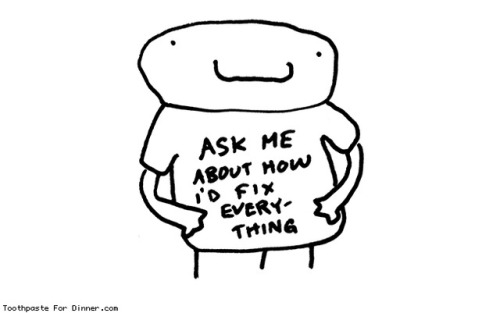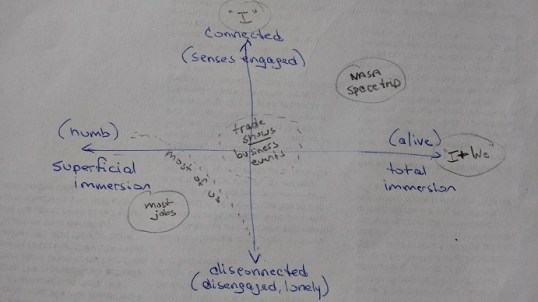
====================
“Okay, I said. But remember, you can’t fix
everything in the world for everybody.”
“However,” said Ricky, “you can’t do
anything at all unless you begin. Haven’t
I heard you say that once or twice, or
maybe a hundred times?”
―
Mary Oliver
===============
In business I am a self proclaimed renovator. That means I like to fix things. Well. No. It means all I know how to do is fix things and I believe everything can be fixed.
This also means I cannot build shit from scratch.
For me it’s all about improving and/or fixing. Interestingly I have a small group of friends who are fixers (while meeting a variety of business people over the years I haven’t really met many what I would call true fixers). I don’t believe the ‘fixer’ ability is really that unique nor special nor even that it takes excessive intellectual capacity, but I believe the true fixers remain a relatively small group because there is an inherent slightly warped perspective <I will get back to that>.
Anyway. I just talked to another ‘fixer’ about her job <and quitting it>. As usual, we spent some time talking about fixing … and what if we couldn’t actually fix something.
Now. This is a quasi-epiphany like discussion. Because fixers believe they can fix anything. It doesn’t matter. Whatever needs fixing we believe it can not only be fixed but that we can fix it. And I truly mean whatever.
We aggravate a lot of people (who aren’t fixer personalities) because we are also pragmatic respectful-cynical optimists. What do I mean? To believe anything can be fixed you have to have gobs of optimism. Relentless optimism. This isn’t ego. This is simply a belief that nothing cannot be fixed. Ah. But there is equal amount of pragmatism. Because you also have to be practical, logical and ruthless with regard to tearing apart whatever needs to be fixed to put it back together so it is fixed.
Those two characteristics, belief & pragmatism, bookend respectful cynicism.
A fixer is cynical, and respectful, of every component and part and piece and person of that which they are fixing. A good fixer recognizes parts need to be fixed to completely heal the whole and, yet, some parts don’t need to be fixed – just reconfigured with the new fixed parts. Therefore a fixer is cynical of all that has come before and currently is while at the exact same time respectful of all pieces and parts. I would note, as part of the respectful attitude, rarely does a fixer find what needs to be fixed was created by a blithering idiot. Business is strewn with brilliant people being asked to do things beyond their own brilliance. The odds are you are fixing some unintentional consequence rather than some intended misguided behavior.
Respect that which is.
Be cynical of what is.
A fixer dances this dance better than a winner on dancing with the stars.
Beyond the personal fortitude and characteristics fixers eventually need help (although it pains them to admit … oh … and the help recognition typically only comes with some maturity). This comes because Fixers never blame anyone else when things don’t get fixed- only themselves (it comes along with the whole “able to fix anything” mentality). It is a reflection of the personal responsibility to fix.
Anyway. The recognition of need for help is important <which is why you don’t see a lot of older fixers … not recognizing the help factor affects mortality rate>. Because although you get better at assessing “fixability” with time and experience once you are actually in the ‘fix game’ the focus is (laser like) is on fixing. And if you don’t have someone else around to clean up behind you or maybe cover your flanks it can get dangerously blinding toward the end game (without regard for an escape path).
Okay. Let me take something back. We don’t aggravate most people. Frankly, most people just don’t like us. Regardless. If you accept the optimism and pragmatism and respectful cynicism then you will understand this next thought. This means we will go as deep into the hole for as long as it takes to fix the innards. And keep going and stay until it is fixed.
There is an inherent danger in this. In fact. Lots of fixers die down in the hole. They just get sucked so far into the black of the hole they cannot see the way out. And worse, the unimaginable, what if we can’t fix it? We often don’t know when to try and stop fixing (a by product of the fact we just cannot believe it can’t be fixed).
 When my friend and I talked we laughed (a little uneasily) about the unfixable to fixers. Admitting something cannot be fixed to a fixer rocks the foundation of everything we stand for. How do we deal with it (so we don’t spontaneously combust)?
When my friend and I talked we laughed (a little uneasily) about the unfixable to fixers. Admitting something cannot be fixed to a fixer rocks the foundation of everything we stand for. How do we deal with it (so we don’t spontaneously combust)?
Well. First. We justify things by saying “we cannot fix it ourselves” (we need others to be aligned). And in many cases this is actually true. We share this thinking grudgingly. True fixers believe all you really have to do is to show the way and others will inevitably recognize “the way” and will follow your lead (doesn’t have to be true following it can simply be replicating desired behavior). Why did I make that point? True fixers like to lead but that isn’t what they are all about. Its about …well … fixing. Anyway. The truth is that some things cannot be fixed solely by a fixer.
Second. As we gain experience and face fixing problems with significantly more depth and breadth we recognize there are truly aspects of “alignment” necessary to make the “fix” work. Therefore seniority, titles and responsibility are a means to an end. Most fixers would accept the title of “waste management apprentice” as long as limitless responsibility was attached to it. Fixers don’t attach self worth/esteem/actualization on titles or money but rather the ‘fix.’
Ok. I say all this because the big discussion with my friend was on a counter offer when faced with her resignation. (note: Now. I admit. I am not a counteroffer fan – as a giver or receiver … I kind of feel it is a lose/lose deal. Well. Both may win short term -employee stays and gets what they deserved in the first place- but long term the employer is unhappy they were forced to do something and employee is aggravated they had to force their hand)
But the big discussion centered around “is what they are offering going to enable you to fix” as well as “would anything be able to fix” and finally “what should you outline as your ‘if I were to stay here is the only scenario’ counteroffer.” Note that all is discussed with an eye toward the fixer nirvana — fixing something. And we had the incredibly difficult moment as we reached an “I don’t think you can fix it discussion.”
I didn’t like saying it.
She didn’t like to hear it.
And if I wasn’t a fixer (talking to another fixer) I am not sure she would have really listened.
Yet. In the end we both agreed no counteroffer was not worth considering unless it enabled the ultimate source of the resignation impetus – the inability to fix.
Ok. I wrote this for a couple of reasons.
– Self-reflection as a fixer-renovator.
Strengths (or maybe not a strength but rather simply ‘what you do’) follows the general rule in life … balance. Because whatever it is that you do … it comes at the expense of something else. It is silly, if not foolish, to believe you are good at everything or the thing you are good at makes everything else unimportant. As with everything in life it is all about tradeoffs. I tend to believe that is why there is a relatively small circle of fixers. As with anything not many people are willing to sacrifice some pretty important things to focus on a specialty like fixing (which can come at a fairly high cost).
 – Reflection on what you may be good at.
– Reflection on what you may be good at.
I imagine I like writing about focus and recognition of what you really like to do as well as the good and bad that comes along with such a recognition. I am a really really lucky man (ok … possibly just an overgrown boy). I know what I am in business (not sure I know in everyday life … still perpetually learning).
The good and the bad. And the risks that come along with the rewards. I admit that I was really fortunate as I passed through middle management.
I always had someone who would send me down the rabbit hole and let me go as deep into the dark as needed and make sure that I never got too lost in the dark as well they also “fixed” (or enabled) some of the really necessary ancillary stuff so I could fix. And, in hindsight, they also had the ability to recognize what could be fixed was fixed and pulled me out before I killed myself on the unfixable <note: not everyone is as fortunate>.
But. And this is a big but. I am a fixer through and through. Even now. Even though I know some things are so dysfunctional they cannot be solved by me, my initial thought is always “it can be fixed and I can fix it”. And I am no different than other fixers.
I say that last point just to say … despite the fact I am relatively aware of all this I am not sure it makes anything easier in the end. Other than the fact I have drawn a clear line in the sand with regard to what I will do and won’t do and what I will compromise and what I won’t.
I hope that is a good thing. It may not be, but it is a decision I am okay with. Because I am a fixer.








 These are questions that reside within each of us <whether we elect to admit that they exist or not>.
These are questions that reside within each of us <whether we elect to admit that they exist or not>.







 bored with using the same words and thoughts over and over again> and I came across the Saul Alinsky quote ( the second one I used upfront).
bored with using the same words and thoughts over and over again> and I came across the Saul Alinsky quote ( the second one I used upfront). Money comes and goes.
Money comes and goes. Ok. Here is why I loved this one. I loved it because bullshit & hollow rhetoric and promises/claims are strewn throughout the business world. I can guarantee, with 95% certainty, I could pick up any business’s vision & strategy & ‘rules of the road’ binder and find a significant amount of hollow bullshit. What would happen if I consciously attacked one of my competitor’s hollow shit? Make them live up to their own book of rules?
Ok. Here is why I loved this one. I loved it because bullshit & hollow rhetoric and promises/claims are strewn throughout the business world. I can guarantee, with 95% certainty, I could pick up any business’s vision & strategy & ‘rules of the road’ binder and find a significant amount of hollow bullshit. What would happen if I consciously attacked one of my competitor’s hollow shit? Make them live up to their own book of rules? some swagger and vocalizing your swagger is … well … infuriating to some competition. It puts pressure on them. Ridiculing, specifically, what a competitor believes is their most potent weapon will … well … infuriate them.
some swagger and vocalizing your swagger is … well … infuriating to some competition. It puts pressure on them. Ridiculing, specifically, what a competitor believes is their most potent weapon will … well … infuriate them. Tactical adaptation is possibly one of the most underrated strategic decisions a business can make. While we talk a good game on this in today’s ‘digital world’ the truth is that most of us chase numbers more than we think about outflanking and expertise advantages. That is kind of the bane of the ‘big data’ world.
Tactical adaptation is possibly one of the most underrated strategic decisions a business can make. While we talk a good game on this in today’s ‘digital world’ the truth is that most of us chase numbers more than we think about outflanking and expertise advantages. That is kind of the bane of the ‘big data’ world. I call this “consolidating a win.”
I call this “consolidating a win.” 99% of companies do not even think about let alone adhere to. Most businesses target another competitor’s users & customers and go about trying to steal them <persuade them to switch>.
99% of companies do not even think about let alone adhere to. Most businesses target another competitor’s users & customers and go about trying to steal them <persuade them to switch>.














 This is about leadership & leading with an idea.
This is about leadership & leading with an idea.
 Bad leaders misunderstand leading with an idea. They always feel like they have to have an enemy which the idea has to slay. Or they feel like they have to divide so that their idea looks bigger. They have it wrong. And dangerously wrong. Good ideas power up on their own. Good ideas have a size to stand up to, well, any size idea out there. Good ideas encourage people to go out and evangelize not destroy or kill or attack. The belief in the idea, in and of itself, is enough to make people go out & sometimes attack bad ideas, more often defend the idea, and all the time presents the idea as some desirable thing that anyone in their right mind should want.
Bad leaders misunderstand leading with an idea. They always feel like they have to have an enemy which the idea has to slay. Or they feel like they have to divide so that their idea looks bigger. They have it wrong. And dangerously wrong. Good ideas power up on their own. Good ideas have a size to stand up to, well, any size idea out there. Good ideas encourage people to go out and evangelize not destroy or kill or attack. The belief in the idea, in and of itself, is enough to make people go out & sometimes attack bad ideas, more often defend the idea, and all the time presents the idea as some desirable thing that anyone in their right mind should want. Simplistically every leader’s objective is always to free your employee to be their best and do their best. But sometimes this means stripping something away, and sometimes this means adding something, and it always means giving them something to believe in <not just do or ‘fight’>. By the way. I’m not sure if this is really Purpose or even a Vision but rather it is something internal in each person. An inner fire to be a better version of who they are tomorrow than they are today — which means it is not a destination but rather progress that matters.
Simplistically every leader’s objective is always to free your employee to be their best and do their best. But sometimes this means stripping something away, and sometimes this means adding something, and it always means giving them something to believe in <not just do or ‘fight’>. By the way. I’m not sure if this is really Purpose or even a Vision but rather it is something internal in each person. An inner fire to be a better version of who they are tomorrow than they are today — which means it is not a destination but rather progress that matters. as the compass AND engine for the true potential of the organization.
as the compass AND engine for the true potential of the organization.


